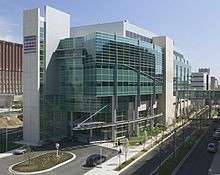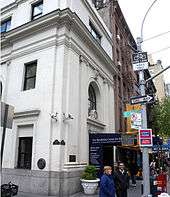NCI-designated Cancer Center
NCI-designated Cancer Centers are a group of 71 cancer research institutions in the United States supported by the National Cancer Institute.[1]
Program
Three designations are recognized: Comprehensive Cancer Centers, Cancer Centers, and Basic Laboratory Cancer Centers. As of 2019, there are 51 Comprehensive Cancer Centers, 14 Cancer Centers, and 7 Basic Laboratory Cancer Centers. Almost all are associated with a university. Receiving the NCI-designation places cancer centers among the top 4 percent of the approximately 1,500 cancer centers in the United States.
The standards for Comprehensive Cancer Centers are the most restrictive of the types. These facilities must demonstrate expertise in each of three areas: laboratory, clinical, and behavioral and population-based research. Comprehensive Cancer Centers are expected to initiate and conduct early phase, innovative clinical trials and to participate in the NCI's cooperative groups by providing leadership and recruiting patients for trials. Comprehensive Cancer Centers must also conduct activities in outreach and education, and provide information on advances in healthcare for both healthcare professionals and the public. Comprehensive cancer centers may apply for up to $1.5 million per year from the Department of Health and Human Services.[2] Clinical Cancer Centers generally conduct a combination of basic, population sciences, and clinical research, and are encouraged to stimulate collaborative research involving more than one field of study. Clinical cancer centers may apply for up to $1.4 million per year. Basic Laboratory Cancer Centers conduct only laboratory research and do not provide patient treatment. Basic Laboratory Cancer Centers are more often affiliated with research institutes rather than universities. They are eligible to apply for up to $1.2 million per year.[2] Independent or freestanding cancer centers are entities unto themselves and are not considered to be part of a larger institution or university. The center’s administration controls all space, appointments, and budgets. These institutions may have university affiliations, but they remain administratively and financially distinct.[3]
Cancer centers must renew their status with the NIH every 5 years. The NIH funds cancer centers through a P30 Cancer Center Support Grant (CCSG) mechanism.[2] To be eligible to apply, a cancer center must receive at least $10 million in cancer research funding annually. Preparation for these grant applications can be extensive. The most recent grant application prepared by MD Anderson Cancer Center took 24 months to prepare and was 2,963 pages.[4]
The NCI considers the following characteristics essential to a cancer center, and requires that applications address the institutions' resources in the areas of:[2]
- Physical Space
- Organizational Capabilities
- Transdisciplinary Collaboration and Coordination
- Cancer Focus
- Institutional Commitment
- Center Director
These grants fund shared resources to further the goals of the National Cancer Institute. Some of these include the administration of cancer research programs, training activities, core facilities with technology shared by investigators, and clinical trial management services.[2]
The NCI also supports Consortium Centers, wherein scientists and clinicians from multiple institutions enter into formal agreements to expand cancer research programs.[2]
In 2015, more than 353,000 new patients were enrolled in a clinical trial at an NCI-designated Cancer Center.[5]
List of centers
Comprehensive cancer centers


- Alabama (1): UAB Comprehensive Cancer Center at the University of Alabama at Birmingham
- Arizona (1): The University of Arizona Cancer Center at the University of Arizona (Tucson)
- California (8):
- Chao Family Comprehensive Cancer Center at the University of California, Irvine
- City of Hope National Medical Center (Duarte) (independent)
- UCLA Jonsson Comprehensive Cancer Center at the University of California, Los Angeles
- UC San Diego Moores Cancer Center at University of California, San Diego
- UCSF Helen Diller Family Comprehensive Cancer Center at the University of California, San Francisco
- UC Davis Comprehensive Cancer Center at the University of California, Davis (Sacramento)
- USC Norris Comprehensive Cancer Center at the University of Southern California (Los Angeles)
- Stanford Cancer Institute (Stanford, CA)[6]
- Colorado (1): University of Colorado Cancer Center at the University of Colorado (Aurora)
- Connecticut (1): Yale Cancer Center at Yale University School of Medicine (New Haven)
- District of Columbia (1): Georgetown Lombardi Comprehensive Cancer Center at Georgetown University (Washington)
- Florida (1): Moffitt Cancer Center at the University of South Florida (Tampa)
- Georgia (1): Winship Cancer Institute at Emory University (Atlanta)
- Illinois (2):
- Robert H. Lurie Comprehensive Cancer Center at Northwestern University (Chicago)
- University of Chicago Comprehensive Cancer Center (Chicago)
- Iowa (1): Holden Comprehensive Cancer Center at University of Iowa (Iowa City)
- Maryland (2):
- Sidney Kimmel Comprehensive Cancer Center at Johns Hopkins Medicine (Baltimore)
- University of Maryland Greenebaum Cancer Center (Baltimore)
- Massachusetts (1): Dana-Farber/Harvard Cancer Center (Boston)
- Michigan (2):
- Barbara Ann Karmanos Cancer Institute (Detroit)
- University of Michigan Rogel Cancer Center (Ann Arbor)
- Minnesota (2):
- Mayo Clinic Cancer Center (Rochester) (independent)
- Masonic Cancer Center at the University of Minnesota (Minneapolis)
- Missouri (1): Alvin J. Siteman Cancer Center at Barnes-Jewish Hospital and Washington University School of Medicine (St. Louis)
- New Hampshire (1): Norris Cotton Cancer Center of Dartmouth-Hitchcock Medical Center (Lebanon)
- New Jersey (1): Cancer Institute of New Jersey at Rutgers (New Brunswick)
- New Mexico (1): University of New Mexico Comprehensive Cancer Center at the University of New Mexico (Albuquerque)
- New York (4):
- Herbert Irving Comprehensive Cancer Center of New York-Presbyterian Hospital and Columbia University Medical Center (New York)
- Memorial Sloan-Kettering Cancer Center (New York) (independent)
- Laura and Isaac Perlmutter Cancer Center at NYU Langone Health (New York)
- Roswell Park Cancer Institute (Buffalo) (independent)
- North Carolina (3):
- Wake Forest Comprehensive Cancer Center of Wake Forest University (Winston-Salem)
- Duke Cancer Institute at Duke University (Durham)
- Lineberger Comprehensive Cancer Center at UNC (Chapel Hill)
- Ohio (2):
- Case Comprehensive Cancer Center (Case Western Reserve University, University Hospitals Seidman Cancer Center, & Cleveland Clinic Taussig Cancer Institute) (Cleveland)
- The Arthur G. James Cancer Hospital & Richard J. Solove Research Institute at Ohio State University (Columbus)
- Oklahoma (1): Stephenson Cancer Center at University of Oklahoma Health Sciences Center (Oklahoma City)
- Oregon (1): Knight Cancer Institute at Oregon Health & Science University (Portland)
- Pennsylvania (3):
- Abramson Cancer Center at the University of Pennsylvania (Philadelphia)
- Fox Chase Cancer Center at Temple University (Philadelphia)
- UPMC Hillman Cancer Center at the University of Pittsburgh (Pittsburgh)
- Tennessee (2):
- Vanderbilt-Ingram Cancer Center at Vanderbilt University (Nashville)
- St. Jude Children's Research Hospital (Memphis) (independent)
- Texas (3):
- Dan L Duncan Cancer Center at Baylor College of Medicine (Houston)
- Harold C. Simmons Cancer Center at University of Texas Southwestern Medical Center (Dallas)
- The University of Texas MD Anderson Cancer Center (Houston) (independent)
- Utah (1): Huntsman Cancer Institute at the University of Utah (Salt Lake City)
- Washington (1): Fred Hutchinson Cancer Research Center (Seattle)
- Wisconsin (1): University of Wisconsin Carbone Cancer Center at the University of Wisconsin Hospitals and Clinics (Madison)
Clinical Cancer Centers
- Florida (1): Sylvester Comprehensive Cancer Center of Miller School of Medicine at University of Miami (Miami)
- Hawaii (1): University of Hawaii Cancer Center (Honolulu)
- Indiana (1): Indiana University Cancer Center (Indianapolis)
- Kansas (1): University of Kansas Cancer Center (Kansas City)
- Kentucky (1): Markey Cancer Center at the University of Kentucky (Lexington)
- Nebraska (1): University of Nebraska Medical Center Fred & Pamela Buffett Cancer Center (Omaha)
- New York (2):
- Albert Einstein Cancer Center at the Albert Einstein College of Medicine (Bronx)
- Tisch Cancer Institute at Mount Sinai Health System (New York)
- Pennsylvania (1): Sidney Kimmel Cancer Center at Thomas Jefferson University Hospital (Philadelphia)
- South Carolina (1): Medical University of South Carolina's Hollings Cancer Center
- Texas (1): UT Health San Antonio Cancer Center of the University of Texas Health Science Center at San Antonio
- Virginia (2):
- Massey Cancer Center of Virginia Commonwealth University (Richmond)
- University of Virginia Cancer Center (Charlottesville)
Basic laboratory cancer centers
- California (2):
- Sanford Burnham Prebys Medical Discovery Institute (La Jolla) (independent)
- Salk Institute for Biological Studies (La Jolla) (independent)
- Indiana (1): Purdue Cancer Center (West Lafayette)
- Massachusetts (1): David H. Koch Institute for Integrative Cancer Research at MIT (Cambridge)
- Maine (1): Jackson Laboratory (Bar Harbor, Maine, and Farmington, Connecticut) (independent)
- New York (1): Cold Spring Harbor Laboratory (Cold Spring Harbor) (independent)
- Pennsylvania (1): Wistar Institute (Philadelphia)
References
- "NCI-Designated Cancer Centers". National Cancer Institute.
- "PAR-17-095: Cancer Center Support Grants (CCSGs) for NCI-designated Cancer Centers (P30)". grants.nih.gov.
- Simone, Joseph V. (1 December 2002). "Understanding Cancer Centers". Journal of Clinical Oncology. 20 (23): 4503–4507. doi:10.1200/jco.2002.07.574.
- "treat the immune system, attack the cancer". MD Anderson Cancer Center.
- "DT3 - OCCWebApp 2.1.0". cancercenters.cancer.gov.
- "About Us". Stanford Medicine Cancer Institute.